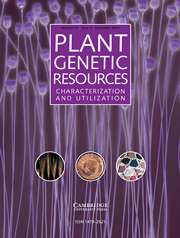Article contents
Phenotypic evaluation of the Chinese mini-mini core collection of peanut (Arachis hypogaea L.) and assessment for resistance to bacterial wilt disease caused by Ralstonia solanacearum
Published online by Cambridge University Press: 29 November 2012
Abstract
In order to utilize germplasm resources more efficiently for peanut (Arachis hypogaea L.) genetic improvement, a core collection of 576 accessions and a primary mini core collection of 298 accessions were developed previously from a collection of 6839 cultivated peanut lines stored at the Oil Crops Research Institute of Chinese Academy of Agricultural Sciences at Wuhan. For an efficient evaluation and characterization of the most useful agronomic and disease-resistant traits, an even smaller collection of peanut accessions that represent a spectrum of phenotypes could be more desirable. For this reason, a mini-mini core collection with 99 accessions from the core accessions was developed based on the analysis of 21 morphological traits. It was demonstrated that there were no significant differences between the core and mini-mini core collections in 20 out of the 21 morphological traits studied. Further, the mini-mini core collection captured the ranges of all of the 21 traits displayed in the core collection. The newly developed mini-mini core collection was assessed for resistance to bacterial wilt disease caused by Ralstonia solanacearum. Two accessions showing a high level of resistance to bacterial wilt were identified, demonstrating the usefulness of the mini-mini core collection. The mini-mini-core collection provides a more efficient means of germplasm evaluation and will be resequenced as part of the International Peanut Genome Consortium sequencing project at the UC-Davis Genome Center.
- Type
- Research Article
- Information
- Copyright
- Copyright © NIAB 2012
References
- 11
- Cited by


